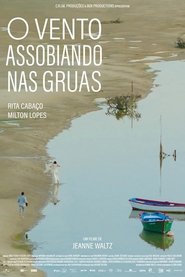detail profile romeu runa
Peran Yang Di Mainkan Romeu Runa
 1907 Afonso a doctor arrives at Principe...
1907 Afonso a doctor arrives at Principe...Banzo 2024
1907. Afonso, a doctor, arrives at Principe Island to cure servants from a cocoa plantation “infected” with Banzo, nostalgia of the slaves, who are dying from starvation and suicide. The group is confined to the forest, where Afonso decides to heal them by trying to understand what is affecting their soul. Will he manage to save them?
 Algarve late 90s Following the death...
Algarve late 90s Following the death...The Fortunate Ones 2024
Algarve, late 90s. Following the death of her grandmother, Milene - a strong young woman full of life despite a slight mental handicap - divides her life between her family of notables and a Cape Verdean family that keeps her going, whom she met when her grandmother died. The wind that whistles in the cranes plunges us into the world of two families against the backdrop of Portugal's recent past.
 Thirtysomething Vtor still lives with his...
Thirtysomething Vtor still lives with his...We Are on Air 2024
Thirty-something Vítor still lives with his mother, Fátima, in his grandmother Júlia’s apartment. Fátima is a hairdresser with a quiet disposition who, at night, fantasises about the policeman who has just moved in next door. By day, Vítor is a lowly employee on a TV show. But at night, he dons his neighbour’s uniform to win the favour and satisfy the desires of a boy he’s met online. In her retirement home, Júlia is unable to sleep at night and has long forgotten what drugs she is meant to be taking. She misses her dead husband, who manifests himself in the body of a living friend, and gets involved in her daily activities. Through these characters, Diogo Costa Amarante constructs a fascinating portrait of lives lived while desires remain unrealised.
 October 2019 Great Yarmouth Norfolk UK Three...
October 2019 Great Yarmouth Norfolk UK Three...Great Yarmouth: Provisional Figures 2022
October 2019, Great Yarmouth, Norfolk (UK). Three months before Brexit. Hundreds of Portuguese migrant workers pour into town, seeking work at the local turkey factories. Tânia (The Mother of the Portuguese), a former worker in these poultry plants, is now married to an English hotel owner. She is the perfect facilitator for the Portuguese workers, but dreams of becoming a British citizen and leaving this dirty business behind by transforming her husband’s derelict hotels into refurbished senior citizens homes.
 The economic crisis a teddy bear...
The economic crisis a teddy bear...Sadness and Joy in the Life of Giraffes 2019
The economic crisis, a teddy bear with suicidal tendencies named Judy Garland, the Discovery Channel, a black panther and the Russian playwright Anton Tchekhov are all part of the heroic adventure of a little girl who has a problem to solve.
 Lazarus de Jesus is the adopted...
Lazarus de Jesus is the adopted...Armpits 2016
Lazarus de Jesus is the adopted son of a wealthy lady from Lisbon, whom he calls Grandmother. It is she who introduces him to Godfather, a great businessman who takes him as his protégé, and Angelina, the woman Grandma wants him to marry. But Lazarus has other hidden interests, the most important of which is an obsessive fixation on female armpits. When he sees the violinist Maria Pia playing, Lazarus immediately falls in love and starts to live for her, which will precipitate an absolutely unpredictable ending.

